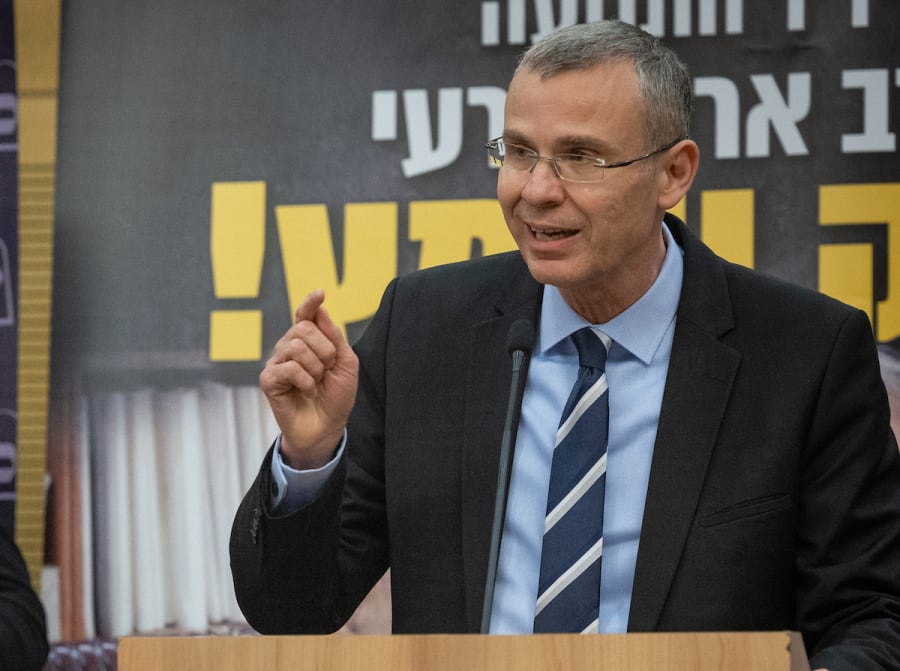Justice minister: No brakes on judicial reform
Despite calls for dialogue, coalition moves forward with controversial legislation

Israeli Justice Minister Yariv Levin is charging ahead with the government’s proposed judicial reforms, despite calls to put on the brakes to allow for more dialogue and debate on the issue which has drawn criticism worldwide.
Levin's statements came after Israeli President Isaac Herzog on Sunday said the legislation should be paused. Levin said in an interview on Sunday's Channel 13 news that wouldn't happen – “even for a minute.”
While many Israelis – even in the judicial system – believe that some reform is needed, there is widespread opposition to the current proposal being pushed forward by the government. The proposals include changing the composition of the judicial selection committee to include more elected officials – most from the governing coalition; canceling the High Court’s ability to annul laws and government decisions; and giving the government the ability to override Supreme Court decisions with a simple majority of 61.
Israelis have staged massive protests and a wide berth of critics from economic and business circles have even voiced their opposition to the proposed reforms, which they say will encroach on democracy, weaken the court and tip the balance of power to the government. Economists have expressed concern that the reforms will cause a downgrade in Israel's credit rating and hamper the ability to do business with the Jewish nation.
Last week, Supreme Court President Esther Hayut also urged Israeli Prime Minister Benjamin Netanyahu to stop the plans and allow a mediation process, according to another Channel 13 report. Kan broadcasting reported yesterday that Hayut – who has come out against the proposed reforms – turned down a request to appear before the Knesset Constitution, Law and Justice Committee to discuss the reforms.
Herzog – who, as president, presides over national discourse and unity – urged calm in recent weeks, but on Sunday called for a temporary pause in order to allow a discussion over the heated issue.
“Stop the whole process for a moment, take a deep breath, allow dialogue to take place, because there is a huge majority of the nation that wants dialogue,” Herzog said.
“When I see people are threatening to murder the prime minister… it’s a terrible thing that needs to be eliminated and the stain removed. One mustn’t use these types of expressions in the discussion. The debate is heating up to a dangerous place, and I call from here on all those involved in the disagreement: stop a moment, breathe.”
“I say this from a place of historical responsibility. I hear that people and public leaders are called names in public and compared to Nazis. People forget what the Holocaust was when they casually use the term ‘Nazi,’” he said.
National Unity party leader Benny Gantz, who sits in the opposition, also called for dialogue, but said he is opposed to the entirety of the current legislation.
“From everything that I have heard so far, there is not one item in the judicial reform that serves the citizen, all it contains is ways to give the government and the Knesset more power against the judicial system,” he said. “(Prime Minister Benjamin) Netanyahu has no legitimacy to change the form of government in Israel – this is what we’re fighting for.”
In an opinion released last week, Attorney General Gali Baharav-Miara said that the reforms would “fundamentally change the democratic nature of the state’s governance.”
Levin said this is exactly the type of judicial superiority the coalition is trying to stop.
“Really, the attorney general did exactly what we object to. Instead of advising, she decided that the reform was unacceptable to her and shot it down,” he said.
The coalition, which has a 64-seat majority (of 120), does not appear willing to budge. In a briefing last week, Knesset Member Simcha Rothman called the Supreme Court a self-appointing body and said the attorney general has too much power.
“Israel is the only country in the world that has the position like the chief legal advisor that is so powerful,” said the chairman of the Israeli parliament’s Constitution, Law and Justice Committee. “Israel is the only country in the world where the chief legal advisor’s decision is binding. Israel is the only country in the world where you have the monopoly on representation on the courts and can decide the position it represents and disallows people to come and present their position. Israel is the only country in the world that can cancel their laws without a constitution.”
“That’s why the distance between the public in Israel and the court – it's an ever-growing distance.”

Nicole Jansezian was the news editor and senior correspondent for ALL ISRAEL NEWS.













